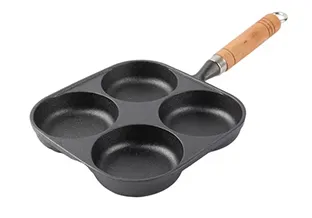
cast iron good for cooking
The Benefits of Using Cast Iron for Cooking
Cast iron cookware has been a staple in kitchens for centuries, and for good reason. Many chefs and home cooks alike swear by their cast iron pans and pots. But what makes cast iron such a beloved choice for cooking? Let's explore the advantages and benefits of using cast iron in the kitchen.
1. Excellent Heat Retention and Distribution
One of the most significant advantages of cast iron is its ability to retain and distribute heat evenly. When properly preheated, a cast iron skillet can maintain its temperature, providing a consistent cooking surface that helps prevent hotspots and ensures even cooking. This is particularly beneficial for tasks like searing meat, where high and even heat is crucial for achieving that perfect crust.
2. Naturally Non-Stick Surface
With regular seasoning, cast iron cookware develops a natural non-stick patina. This means that foods are less likely to stick to the surface, making it easier to cook and clean up afterward. Unlike synthetic non-stick coatings, which can degrade over time and may contain harmful chemicals, cast iron's seasoning is safe and can last for generations if maintained properly.
3. Versatility Across Cooking Methods
Cast iron is incredibly versatile and can be used in various cooking applications. It can go from the stovetop to the oven, making it perfect for recipes that require both sautéing and baking. Whether you're frying, roasting, or even baking bread, a cast iron skillet or Dutch oven can handle it all. This adaptability makes it a valuable addition to any kitchen.
4. Durability and Longevity
Cast iron cookware can last a lifetime or even longer if cared for properly. Unlike other materials that may warp, scratch, or need to be replaced, cast iron can withstand high temperatures and heavy use. Many people find that with appropriate maintenance—such as regular seasoning and careful cleaning—cast iron cookware can be passed down through generations, making it a sustainable option.
cast iron good for cooking

5. Health Benefits
Cooking with cast iron can also enhance the nutritional value of your meals. When you cook with cast iron, a small amount of iron can leach into your food, which can be particularly beneficial for individuals who may be at risk of iron deficiency. This can be especially advantageous for vegetarians or those with dietary restrictions that may limit their iron intake.
6. Cost-Effectiveness
Investing in cast iron cookware can be more cost-effective in the long run. Although the initial purchase price may be higher than other cooking materials, its durability and longevity mean you won't need to replace it as often. Furthermore, they often require little to no maintenance costs beyond seasoning and occasional repairs, making them an economical choice.
7. Enhancing Flavor Profiles
Many cooks appreciate the unique flavor that cast iron can impart. The seasoning of the skillet can contribute to the overall taste of dishes, especially in sautéed or fried foods. Over time, as the pan builds up its seasoning, it can enhance the flavors of roasted vegetables, meats, and even desserts.
8. Eco-Friendly Cooking
Choosing cast iron is also an environmentally friendly option. With no synthetic coatings, the pan does not release harmful chemicals during use. Additionally, its longevity means less waste in landfills compared to disposable or short-lived cookware.
Conclusion
In summary, cast iron cookware offers a plethora of benefits that make it an exceptional choice for cooking enthusiasts. From its superior heat retention and versatility to its health benefits and durability, it’s no wonder why cast iron remains a popular choice in kitchens around the world. With proper care, cast iron can last a lifetime, making it not only a wise investment for today but a legacy for the future. Whether you are a novice cook or a seasoned chef, incorporating cast iron into your kitchen arsenal is sure to enhance your culinary experience.
-
Season Cast Iron Perfectly with GPT-4 Turbo TipsNewsAug.01,2025
-
High Quality Cast Iron Cookware - Baixiang County Zhongda MachineryNewsAug.01,2025
-
Premium Cast Iron Pan: Durable & Perfect HeatNewsAug.01,2025
-
High Quality Kitchen Durable Black Round Cast Iron Cookware Pancake Crepe Pan-Baixiang County Zhongda Machinery Manufacturing Co., Ltd.NewsAug.01,2025
-
Cast Iron Cookware - Baixiang County Zhongda Machinery | Nonstick, Heat ResistanceNewsAug.01,2025
-
High Quality Kitchen Durable Black Round Cast Iron Cookware - Baixiang County Zhongda Machinery | Non-Stick, Heat Retention, DurableNewsJul.31,2025


